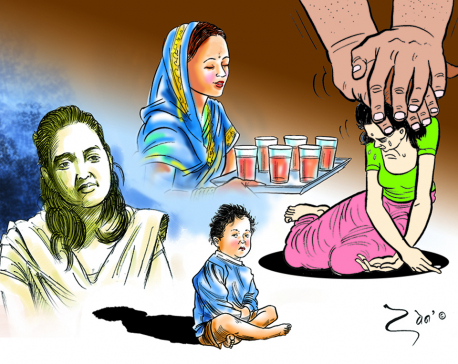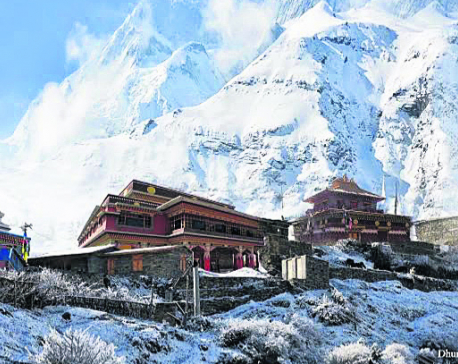
OR
Opinion
Bitcoin, Techno Sapiens, and Blockchain Democracy
Published On: May 10, 2022 02:22 PM NPT By: Bimal Pratap Shah

Nations are not permanent and tend to collapse if positive political goods are not delivered to citizens. Nepal is moving in this direction.
Cryptocurrency is decentralized digital money based on blockchain technology that is making money more digitized, dematerialized, and democratized than ever before. The Central Republic of Africa recently approved Bitcoin as a legal tender to become the second country in the world to do so after El Salvador. Cryptocurrencies, however, face an absolute ban in Nepal and a dozen other countries. If authoritarian governments remain ignorant for too long and fail to adapt to the rapidly evolving technology to cater to the people’s changing needs, new civilization structures like “Decentralized Countries” will arise and eventually supersede nations as we understand them today. The biggest concern for a mismanaged impoverished nation like Nepal will not be cryptocurrencies, but people migrating to a fully decentralized stack boasting larger Gross Domestic Products.
The Gap between the younger and older generations on how they perceive Nepal as a nation is ever-widening. The high unemployment rate and wealth inequality have created an economic inclusion that has disenchanted many, especially the youth. For instance, the very fact that the music video of a song titled “PIR”, shook the republican order to the core says a lot about the pathetic state of democracy in the country. Prakash Saput’s brilliantly crafted music video portrays the disillusionment of many former Maoist combatants who were abandoned by the leadership after the 10-year-old insurgency ended. The story in the music video was so truthful that some members of the Maoist party even went as far as to send warnings to pull down the video from YouTube. Sadly, the singer did end up removing the controversial scene from the music video. Another scene in the viral music video where a child asks her father about the meaning of a nation deeply touched every Nepali around the world. In fact, every eligible voter in Nepal should be thinking about the thought-provoking question before casting their ballot in the elections.
A nation is not just a physical boundary with a name like the USA, Ukraine, Russia, India, and China. A nation is a stable community of people formed based on territory, history, psychological make-up manifested in a common culture, and more importantly shared goals. Furthermore, it is an organizational schema used to organize and orient people to the world around them. Nations are not permanent and tend to collapse if positive political goods are not delivered to citizens. Nepal is moving in this direction.
As discussed earlier, a nation is composed of many different independent parts working to achieve its goals. The independent components are interwoven by a central protocol producing consensus and coordination to allow them to thrive to the best of their ability and collectively help the composed system to create a nourishing environment. These organizational structures are necessary to foster trust, maintain security, and effectively coordinate people to bring stability to the nation. People are taxed for the maintenance and sustenance of nations. Most of the time, people are happy to pay taxes as long as they receive the benefits of good governance in return.
Nations can also be thought of as protocols that dictate the rules of a system to establish standards that everyone can rely on. Protocols and standardization are crucial for efficiency. For instance, Internet Protocol is a set of rules that dictate how data should be delivered over the Internet. The internet can only function if everyone on the network follows the protocol. Religions, nations, the internet, constitution, and trade agreements all represent protocols that dictate how one should communicate and behave with others to increase the speed and efficiency of coordination. Therefore, nations can only function properly and prosper if everyone collectively follows the prescribed rules and regulations, especially the ones in parliament.
Bitcoin can be considered as the next iteration toward a new nation system. The bitcoin network is a peer-to-peer payment network that operates on a cryptographic protocol. It can reach everyone on the Internet and also has the potential to be a platform for commerce and economy that allow humans to take a significant leap forward in their effort to ‘get coordinated.’ Digital nations, with improved architecture, are the next step in large-scale human organizations in the age of the Internet. Sadly, traditional nations are not happy with this transformation and are trying to put a ban on this radical innovation of cryptocurrencies.
Bitcoin is considered a threat to the monetary system used by nations to exert control over the populace. Governments in extremely corrupt and dysfunctional countries that are not able to generate foreign currency often institute capital controls to prevent outflows to compensate for their incompetency. Bitcoin’s stateless nature can be used to circumvent capital controls and export wealth for more lucrative returns. Furthermore, citizens can potentially disrupt the existing financial infrastructure system by removing intermediaries like the banks by circumventing the imposed capital controls.
The ability to control money and value is the most powerful tool a nation can use to retain its legitimacy and control people. They do this by creating a fiat currency - a national currency that is not pegged to the price of a commodity such as gold or silver. The value of fiat money is largely based on the public’s faith in the currency issuer like the central bank. If central banks cannot control the value of the currency used by the population, it is no longer possible to control inflation, stability, and soundness of the economic and financial systems. Losing this privilege significantly weakens their power.
Since fiat money is not tied to a tangible asset, its value is dependent on the government’s fiscal policies and regulations. Third-world countries like Nepal often fall victim to ill-formulated monetary policies that lead to hyperinflation. Due to the mismanagement of the economy, people have been attracted to Bitcoin and other cryptocurrencies to protect themselves from state-induced hyper-inflation. If citizens choose to store and manage their value in Bitcoin, traditional nations and governments will no longer have the power to have monopolistic control to fund themselves by printing money through central banks.
Blockchain, an underlying technology used by Bitcoin, can also resolve many flaws of democracy. Blockchain is a distributed, immutable, and secured public ledger. Its consensus mechanism is necessary for democratic systems to work as democracy also functions on the law of consensus. The democratic system running on a blockchain system would be truly decentralized because when one system fails in a distributed or decentralized system, it does not shut down the entire system. For example, in a truly decentralized democratic system, a change in the central government should not impact the provincial governments. Such is not the case in Nepal’s flawed democracy.
In a truly decentralized democratic system, a change in the central government should not impact the provincial governments. Such is not the case in Nepal’s flawed democracy.
Sadly, Nepal has still not been able to make the necessary leap even after the revolution of 2006 because there is an acute lack of vision among the political leadership and bureaucracy to use cutting-edge technologies like blockchain to advance Nepali society. It seems the dreams sold by those who call themselves revolutionaries were too difficult to achieve or maybe the representative democracy currently being used in Nepal is already obsolete, thus dysfunctional.
Nepal needs to discard the archaic democracy and work towards a truly decentralized democratic system suited for the borderless world of Homo-Techno-Sapiens. According to Grimes, Elon Musk’s ex-girlfriend, Homo-Techno-Sapiens are the new physically intelligent species of the coming epoch created through the use of technology-assisted genetic and physical modification. Grimes must have insight in this techno future because Elon Musk is developing a brain-machine interface hoping to develop a god-like superintelligence.
Nepal has still not been able to make the necessary leap even after the revolution of 2006 because there is an acute lack of vision among the political leadership and bureaucracy to use cutting-edge technologies like blockchain to advance Nepali society.
Perhaps it is fitting to end with a quote from Pia Mancini: “We are 21st-century citizens doing our best to interact with 19th century-designed institutions with information technology of the 15th century. It is up to us to design the political and economic systems for the internet generation.”
(The author is in no way encouraging buying and selling of cryptocurrencies in Nepal as it is prohibited by the Government of Nepal but only exploring the potential of cryptocurrencies and blockchain technology.)
You May Like This

Stand against violence
What are the driving factors of violence against women and girls in Nepal? Why are we struggling to stop it?... Read More...

Dhurmus, Suntali to build ‘a Nepal within Nepal’
KATHMANDU, June 5: After successfully completing three settlement projects for earthquake victims and other communities, the actor couple Sitaram Kattel (Dhurmus)... Read More...

Just In
- World Malaria Day: Foreign returnees more susceptible to the vector-borne disease
- MoEST seeks EC’s help in identifying teachers linked to political parties
- 70 community and national forests affected by fire in Parbat till Wednesday
- NEPSE loses 3.24 points, while daily turnover inclines to Rs 2.36 billion
- Pak Embassy awards scholarships to 180 Nepali students
- President Paudel approves mobilization of army personnel for by-elections security
- Bhajang and Ilam by-elections: 69 polling stations classified as ‘highly sensitive’
- Karnali CM Kandel secures vote of confidence



















Leave A Comment